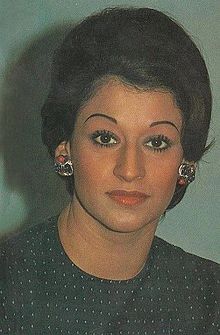Warda Al-Jazairia
| Warda Al-Jazairia وردة الجزائرية |
|
|---|---|

Warda Al-Jazairia, 1977
|
|
| Background information | |
| Birth name | Warda Fatouki |
| Born | July 22, 1939 Puteaux, France |
| Origin | France, Algeria, Lebanon |
| Died | May 17, 2012. Cairo, Egypt, (aged 72) |
| Genres | Egyptian Music, Arabic pop music |
| Occupation(s) | Singer |
| Years active | 1951–1962; 1972–2012 |
| Labels |
EMI Arabia Virgin/EMI Records |
Warda Al-Jazairia (Arabic: وردة الجزائرية 22 July 1939 – 17 May 2012) was an Algerian singer who was well known for her Egyptian Arabic songs and music. Her name literally meant Warda the Algerian, but she was commonly referred to as just Warda (Egyptian Arabic: [ˈwæɾdæ]) or as "The Algerian Rose" in the Arab world.
Warda was born on July 22, 1939, in Puteaux, France, to a Lebanese mother and an Algerian father. She started singing at the age of eleven in 1951. She quickly became well known for her singing of patriotic Arabic songs. In 1972, Algerian president Houari Boumediène asked her to sing to commemorate Algeria's independence, and she performed with an Egyptian orchestra.
She then moved to Egypt, where she made her fame and married the popular Egyptian composer Baligh Hamdi. She performed many of his songs and those of other Egyptian composers, quickly rising to fame and releasing several albums per year. Additionally, she starred in a few Egyptian movies, starring with big movie stars as Roushdy Abaza. She was granted the Egyptian nationality and sang popular nationalist songs for the country as Helwa Belady El Samra.
The Egyptian song "My Great Homeland" ("Al Watan Al Akbar"), was performed by the biggest stars in Egyptian music industry at that time including Abdel Halim Hafez, Shadia, Sabah, Najat Al Saghira and Faiza Kamel. The song denounced colonialism and urged for a united Arab nations to defeat foreign occupation (see Partitioning of the Ottoman Empire).
...
Wikipedia
